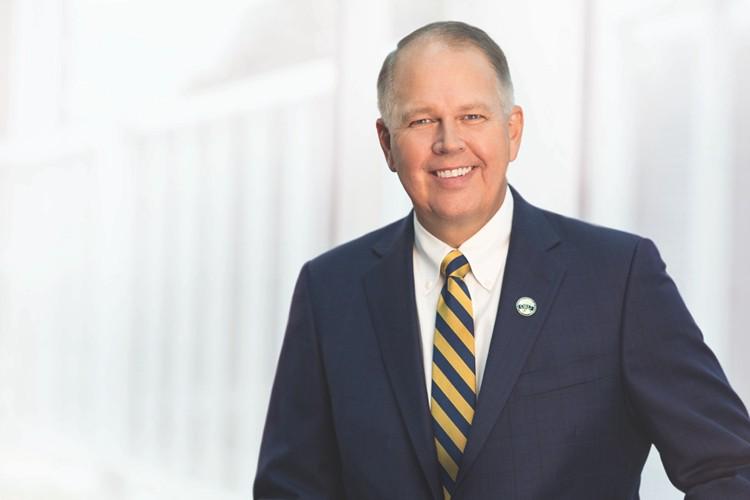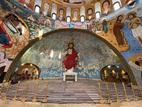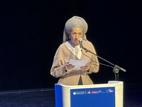Editor's note: About 2,000 years after Jesus ascended to heaven after the resurrection, Dr. William Wilson, president of Oral Roberts University and chair of the Pentecostal World Fellowship, is leading Empowered21, the worldwide relational network to mobilize churches and leaders to fulfill the Great Commission by 2033 through evangelizing one person at a time (see the previous interview here). In the second episode, Dr. Wilson shares his insights about Generation Z, the Pentecostal Church, and the global Church.
China Christian Daily: How can we share the gospel with and minister to Gen Z?
Dr. William M. Wilson: I just wrote a book last year called Generation Z: Born for the Storm. As a college president, most of our students are from Generation Z, so I get to live in a living laboratory with this generation. I believe this is the greatest generation in the history of the world. They're going to change the world more than any generation in history.
Reaching them for Jesus Christ goes along with personalizing the Great Commission. Generation Z has been called the most individualized generation in history: Everyone wants their own playlist, and they all want to be seen and known as individuals. Millennials tend to travel in groups, while Generation Z travels alone. Many times, they’re introverted, quiet, and lonely. One of the big things you can do to reach Generation Z is ask God for His heart to see every single person as important.
They are the most technologically advanced generation in the history of the world. Through technology, we have a chance to break into their introverted world and help them find Jesus, who's with them right where they are. In spite of their mental difficulties and the pressure on them, Jesus is there every single day. I invite you to learn about them, and reaching them with the gospel will unlock the potential of this generation. I love Generation Z, and I’m praying for them. I'm seeing hundreds and thousands of them come to Jesus Christ through our ministry. If you love them, they'll respond and find the love of Jesus.
China Christian Daily: In China, there are some extreme Charismatic churches that pay too much attention to the work of the Holy Spirit, such as miracles and tongues, and some even deviate from the teaching of the truth of the Bible. How do you lead your church to balance the Holy Spirit and the Bible?
Dr. William M. Wilson: What the Holy Spirit has been doing in China and the Chinese church for the last two or three decades has been dramatic. So sometimes, in the dramatic part of it, people may overreact or over respond to the Holy Spirit. It seems radical to those watching the disciples on the Day of Pentecost, and Peter said that they were not drunk. Sometimes people are overreacting, but they are also overreacting against the work of the Holy Spirit. All through history, formal churches have fought against the work of the Spirit. We need both the Holy Spirit and the Bible.
BillySeymour led the great Azusa Street Revival over a hundred years ago. The revival was the public beginning of Pentecostal Christianity. It went on for several years; thousands of people were filled with the Holy Spirit, speaking in tongues, and experiencing miracles and healings. But during that revival, which was very dramatic, people would fall out on top of one another, get out of wheelchairs, and have cancers delivered to them. But Seymour held up the Bible and said, “If it’s in the Bible, we want it; if it’s not in the Bible, we don’t want it.” I would encourage all of you not to pray beyond what God did in the book of Acts and in the ministry of Jesus to happen in your ministry and life.
Remember that the gifts of the Spirit are not a sign of spiritual maturity. Just because a person speaks in tongues, heals the sick, or experiences a miracle does not mean they are grown up in Jesus. The sign of spiritual maturity is the nine kinds of fruit of the Spirit mentioned in Galatians: love, joy, peace, temperance, etc. Do they have more love than they had before? More joy, patience, or peace? The fruit of the Spirit is the personality of Jesus; it is what Jesus would have been like if we had been with him 2000 years ago. The gifts of the Spirit are the abilities of Jesus. In the early church, they could do what Jesus could do: heal the sick, prophesy, and speak words of knowledge or wisdom. We need both in today’s church.
Now, there's a group of believers who don't believe God still does what he did in the Book of Acts. I’ve seen God do every miracle in Acts except two: being transported from one place to another and walking on water. But I’ve seen the dead raised, deaf people hear, blind people see, and crippled people walk. If you don't believe that, then you're going to have a real hard time with what the Holy Spirit is doing in the Chinese Church; but if you do believe that, you also need to study God's Word, mature in Jesus, and be deep in holiness, purity, love, joy, and peace—all of which are critical to being a full-grown Christian.
China Christian Daily: As far as we are concerned, the Pentecostal church tends to focus more on theology. How can you balance the gifts of the Spirit and theology?
Dr. William M. Wilson: Isaiah 54:2 talks about the tent getting bigger by lengthening the cords and strengthening the stakes. Since Pentecostal and Spirit-empowered Christianity are growing and the tent is getting bigger, we also need to take the stakes deeper. Our theology has to be stronger, deeper, and better. We believe that deep in the Bible and deep in the Holy Spirit are not contradictory. In Empowered21, we have an evangelist alliance, but we also have a scholars’ network. We want to evangelize, but we also want to be studying the Scripture and deepening our theology so that we can give a biblically sound answer to the 21st-century world.
China Christian Daily: The recent revival of Asbury in the United States has attracted the attention of many Chinese churches, and many churches here are also eager for revival. How do you think the same revival can happen in China?
Dr. William M. Wilson: I've found among Chinese Christians over the last decade an amazing hunger: running to the altar and seeking God at every opportunity. So I would say to the Chinese church, “Don't lose your hunger for God.” Revival starts with spiritual hunger, so the beginnings of a great revival in the Chinese church are already there.
The Asbury Revival was wonderful, and we experienced something similar at Oral Roberts University: pure, authentic, and simple. Many Evangelical Christians could rest in the Asbury Revival, but for Pentecostal Christians, it wasn’t very strong. The big deal about the Asbury Revival was authenticity, one of the qualities Gen Z longs for the most. They didn’t use lights as the university has not been in great financial shape. It was simply God's presence satisfying their genuine spiritual hunger.
The Evangelical church was being touched in a new way in the United States, particularly churches like Baptists and Presbyterians that are dying. The revival helped revive them and let them experience the freshness of the Holy Spirit. I do believe there's a new Jesus movement and a new generation across the world. There was much preaching in the Asbury Revival, but also a lot of worship. Gen Z wants to experience the reality of Jesus’ presence and know Jesus personally. Worship does that. I would encourage the Chinese church to worship God and spend time seeking God.
China Christian Daily: In the past few decades, the West has also paid attention to the rise of Christianity in Asia, Africa, and Latin America and its decline in Europe and the United States. A large part of this is due to the rise of Pentecostal churches in Asia, Africa, and Latin America. What do you think of this phenomenon and the contribution that the churches in Asia, Africa, and Latin America can make to Christianity in the world?
Dr. William M. Wilson: As I travel around the world, I've preached personally in over a hundred nations now. God is moving in two-thirds of the world in dramatic ways, and it's really impactful to me. The good news for the Western Church is its great influence. Many people have moved from Asia, Africa, and Latin America to North America and Europe. Europe is experiencing some measure of revival: African churches in Europe are passionate about Jesus, or even the Eastern European Church, which had to move out because of the war now in Western Europe, is bringing revival and renewal. Asian believers are literally all over the world, such as Korean believers who have influenced the Church greatly. Africans and Latin Americans are in every community in America. Most of them are prayer missionaries and come from Nigeria to bring the prayer movement of Africa to the U.S.
So the revival of what's happening globally is being shared globally. I don't think we're as isolated as we used to be. We can see what God is doing all over the world thanks to jet travel and the Internet. I watch people worship in Australia, Indonesia, Singapore, the United Kingdom, and South Africa. Within two days, the whole world knew that the revival was happening at Asbury University. Technology has given us a chance to share in a global revival.
I tell my friends in the United States and in the Western Church that no longer does the Church in Asia, Africa, and Latin America need us for much, but they still need an accredited higher education. Oral Roberts University serves our movement around the world. We’ve recruited students from 145 nations in the last three years, and our goal is that by 2030, we will have people from every nation on earth studying at our university. We’re all learning from each other and implementing the best practices wherever they work in our situation. The global Church has grown up and is no longer in its infancy. If we can stay in unity, we can reach more people for Jesus than we’ve reached around the world.












